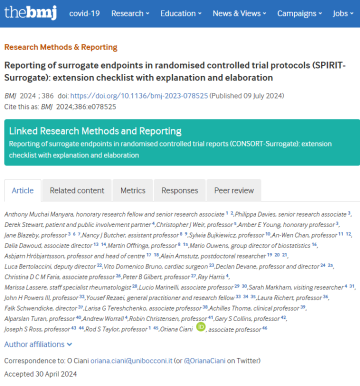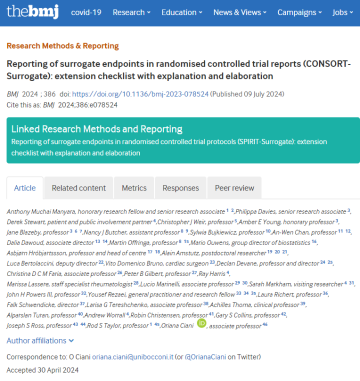New guidance helps researchers set up and report on trials using surrogate outcomes
- 11 July 2024
An international team has developed checklists to help researchers while they set up or report on health care trials where surrogate outcomes are used. The study was jointly led by researchers at the University of Glasgow and Bocconi University in Italy, and the reporting checklists and accompanying documentation have been published in the BMJ.
In health care trials, a target outcome is an event or outcome experienced by a trial participant that lets researchers determine if a treatment has been truly successful. However, instead of target outcomes, researchers can investigate surrogate outcomes. Surrogate outcomes are substitutes for target outcomes. They let researchers conduct shorter trials with fewer participants.
Surrogate outcomes were originally introduced to allow regulators to approve new drugs or treatments for serious or life-threatening diseases more quickly. Despite these potential benefits, using them in trials and for regulatory approval remains highly controversial. The SPIRIT|CONSORT-Surrogate project was formed to improve how researchers report on trials using surrogate outcomes.
SPIRIT (Standard Protocol Items: Recommendations for Interventional Trials) and CONSORT (Consolidated Standards Of Reporting Trials) checklists are evidence-based guidelines created to improve and standardise how researchers design and conduct health care trials. They are widely endorsed as an international standard for trial reporting and using them is required by many high impact journals.
Professor Rod Taylor, co-lead researcher of the study and Professor of Population Heath Research from the University of Glasgow’s MRC/CSO Social and Public Health Sciences Unit and & Robertson Centre for Biostatistics, said:
“The development and publication of our SPIRIT and CONSORT-surrogate outcome checklist extensions has several important implications for improving future trial reporting and transparency.
“First, it is fundamental that trial participants are informed, as part of their consent, when the primary objective of that study is to assess the impact on a surrogate outcome (rather than a final outcome of interest or relevance).
“Second, to help clinicians and policymakers in their appropriate decision making based on trial evidence, research teams need to clarify when they are using a surrogate outcome and interpret their results accordingly.
“Thirdly, future trials informing the approval and market access of new therapies need to use a validated surrogate outcome.”
Dr Oriana Ciani, co-lead study researcher and Associate Professor of Practice in Health Economics and Health Technology Assessment at SDA Bocconi, commented:
“These checklists can contribute to reducing research waste. It is important that these reporting guidelines are now widely disseminated among trial authors, journal editors, and reviewers to enhance completeness, transparency, replicability of methods, interpretation and utility of trial findings across different disease areas and intervention classes.”
Professor Gary Collins, checklist co-author and Professor of Medical Statistics and Director of Centre for Statistics in Medicine and Director of UK EQUATOR based at University of Oxford added:
“Understanding the rationale, design, analysis and results of trials involving surrogate outcomes is predicated on complete and transparent reporting of key details.
“The SPIRIT-CONSORT surrogate extensions are an important set of new recommendations for researchers to ensure their research has value to society and the findings can be used by all stakeholders.”
Prof Professor Jane Blazeby, contributing author from the University of Bristol, said:
“Measuring what matters well in trials is so important. The new guidance will help select, measure and report surrogate outcomes that are valid and ultimately relevant to patients.”

Reporting of surrogate endpoints in randomised controlled trial protocols (SPIRIT-Surrogate): extension checklist with explanation and elaboration

